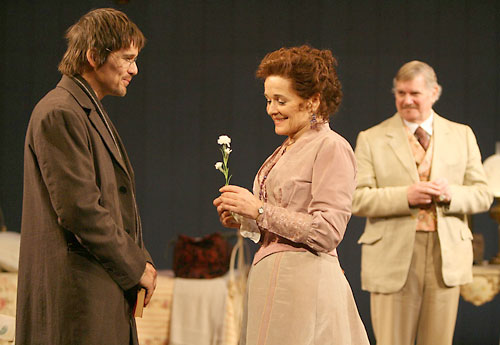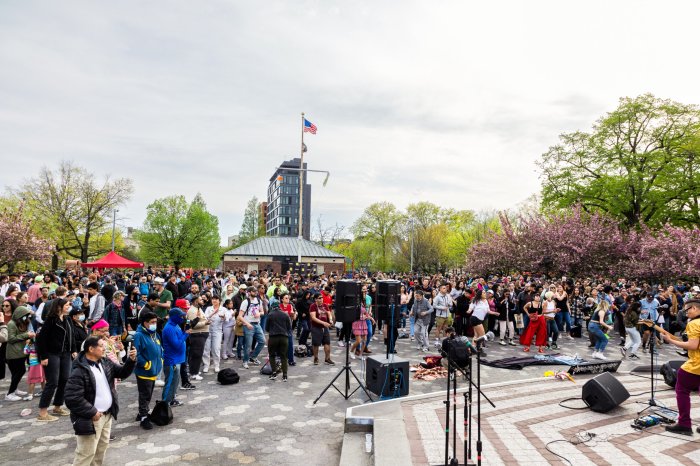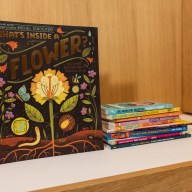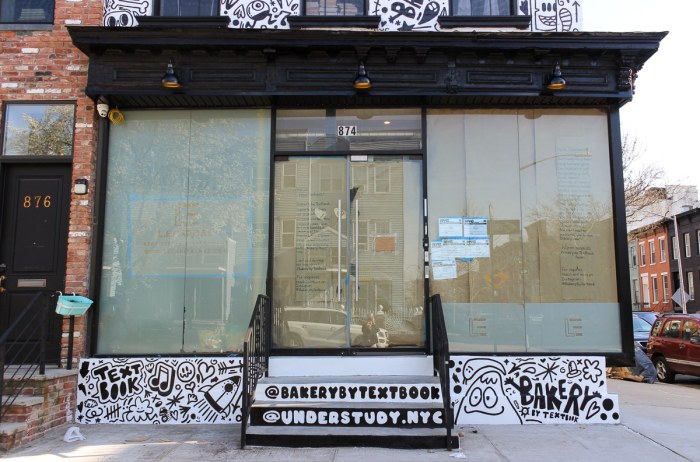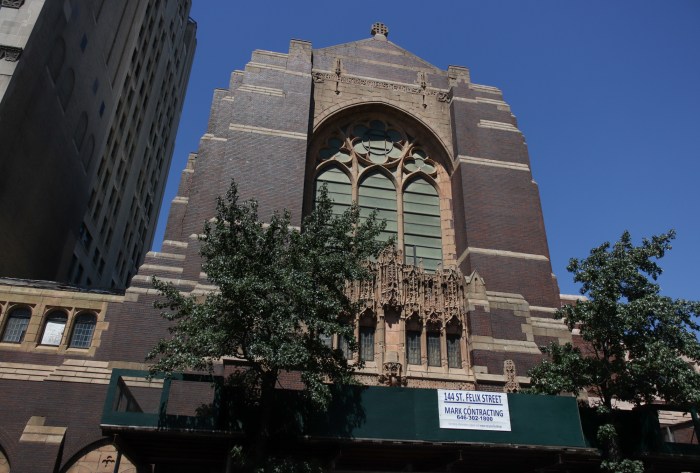There are two great moments in the new production of Chekhov’s “The Cherry Orchard,” running through March 8 at the Brooklyn Academy of Music.
Unfortunately, they both come in the first 20 minutes of this three-hour-long slog.
In one, a do-nothing estate owner sings an ode to an old bookcase, a speech that is a symbol of the orator’s pomposity that is as hilarious as it is telling.
Moments later, he and his sister, who are facing the loss of an estate and the orchard of the play’s title that have been in their family for centuries, ask a local businessman what they should do.
Never mind that the businessman, Boris Borisovich Simeonov-Pischik (played perfectly by the English stage hound Simon Russell Beale), has spent the previous scenes begging, beseeching, praying, hoping, wishing, cajoling, demanding and urging the pair to sell a piece of their land to save the entire estate. When the brother and sister whine again, “What shall we do, please tell us what shall we do?” Beale gets a huge laugh merely by sighing, moving an eyebrow and saying in an accent bordering on the Cockney, “I want you to do what I have been telling you to do every day! Sell your land.”
The laugh gets even sweeter when the audience realizes that neither the brother nor the sister is even listening to the answer.
Much of the first half of the Sam Mendes-directed production captured every bit of the mirthful satire of Chekhov’s 1904 play, one that the Russian writer always considered a comedy.
But the problems begin after the intermission, when the joyful send up of pre-Revolution Russia turns witless and cloying.
Even in his day, Chekhov fought the notion that his play’s conclusion is sad. But few directors, Mendes included, I’m afraid, have the courage to stage it as the farce Chekhov believed it could be. The main problem, of course, is that theater folk want us to sympathize with Ranevskaya, the faded matron of the estate — the one who is constantly asking, “What is to be done,” but simply doesn’t want to “do” anything of the things she could.
Give her a break, Mendes seems to be saying, she’s had a hard life: she lost her youngest child to drowning, lost a husband to drink, lost a fortune to a swindler, lost her innocence to hard times and is about to lose her most-cherished possession, the cherry orchard, to her and her generation’s own backwardness. (And never mind that her main benefactor, Boris Borisovich, is actually the son of her former serf — much to his delight and her horror.)
Sinead Cusack’s Ranevskaya is effervescent and delightful as she careers between pathos and bathos, from intelligence and wit to utter absurdity. Physically, Cusack is the perfect Liubov Andreevna — a woman who retains a youthful vigor, and not just a little of her erotic charge — even as her entire world, the world of that youth, is collapsing around her.
But sympathy? Mendes asks Cusack to earn it from the audience, but it’s an impossible task for any actress.
Her counterpart, Paul Jesson, has a much easier time in the role of Gaev, the ne’er-do-well brother — the one who gives lofty oratory to beloved bookcases or sunsets, yet hasn’t earned a dime in his entire life. As the embodiment of Russia’s declining landed gentry of the 1880s, Gaev can only be played for laughs and ridicule, and Jesson performs sublimely.
In those rare moments when the audience is tempted to feel a tug on its heartstrings for him, Jesson and Mendes are right to relax the fingers, allowing Gaev to just be utterly ridiculous.
But Cusack isn’t afforded this opportunity. She’s thrown out there, lunging and fainting to the last, as the orchard is literally chopped down before her eyes.
By that point in the play, of course, the audience just wants the damn trees eviscerated already. And that’s the point of Chekhov’s “comedy”; it is not sad, the playwright reminds us, that the landed gentry of pre-Revolutionary Russia collapsed under its own inaction — it’s inevitable. It’s tragic, if you will, only by the dictionary definition of the word: something that is simply fated to happen.
Indeed, if there is any takeaway from “The Cherry Orchard,” it is the actual history that the production recalls. Americans like to think of Soviet Communism as some sort of aberration. But “The Cherry Orchard” reminds us anew that there was plenty of pre-Lenin chatter about social equality and a workers utopia from the “men of action,” the intelligentsia, and even the “lishniy cheloveks,” the so-called “superfluous men” of the 1860s who are represented by the character of Gaev.
The proto-Communist character, the perpetual student Trofimov (Ethan Hawke), is earnest, though his earnestness is undercut with his own cowardice — he lacks the courage of his convictions even as those convictions seem to be on the rise.
Hawke, though gorgeous even in his gaunt middle age, stalks the stage like a ghost with a case of bedbugs, full of twitches and ticks. He made all the right choices, playing Trofimov as a walking contradiction, but he could’ve ramped down the physical bits.
He doesn’t benefit from a staging that, as some points, has him and other characters giving some of the most important speeches with their backs turned to the entire left side of the house. The BAM Harvey Theater has odd acoustics that don’t allow such edge-of-the-stage speeches to be heard properly, and Mendes should not have staged such passages that way.
Also due for some deserved criticism is Paul Pyant’s lighting during the entire performance. Partly by design, whole portions of the stage are shrouded in darkness. The goal is to create a brooding mood, but the result are shadows cast on some characters faces as they move from one side of the house to the other. It’s distracting.
Equally underwhelming is Anthony Ward’s sparse set design. The Harvey Theater is an immense space, and Ward’s mini-estate does not live up to it.
That said, heaps of praise are earned by costume designer Catherine Zuber for her historic, yet modern, outfits — including a subtle shift in Gaev’s suit from old man on the estate to modern clerk after he lands his big job at the bank in the play’s waning moments.
And the remaining cast — especially Josh Hamilton as the Paris-obsessed valet Yasha; Richard Easton as the symbol of Old Russia, the old servant Firs; and Rebecca Hall as the much put-upon adopted daughter Varya — is universally excellent.
But at three hours (including intermission), Mendes’s “The Cherry Orchard” is a big slog.
“The Cherry Orchard”
by Anton Chekhov
(adapted by Tom Stoppard)
Brooklyn Academy of Music’s Harvey Theater [651 Fulton St. at Rockwell Place in Fort Greene, (718) 636-4100].
Performances through March 8: Tuesdays through Saturdays at 7:30 pm; Sundays at 3 pm (except Sunday, March 1, when the curtain is at 7:30 pm and Sunday, March 8, when the curtain is at 2 pm).
Tickets: $30-$90. Available at www.bam.org.


